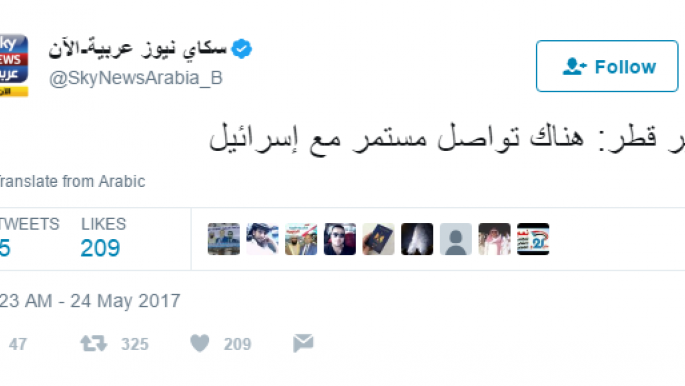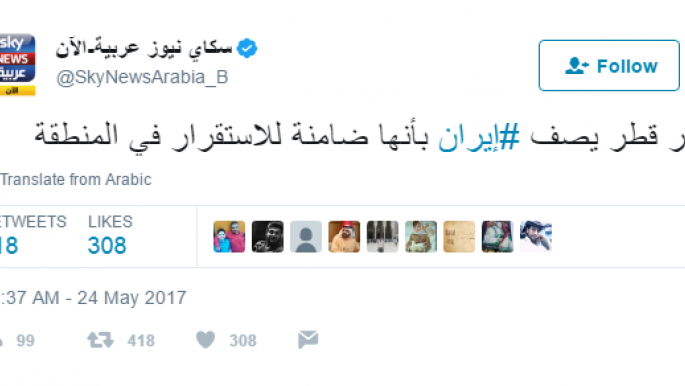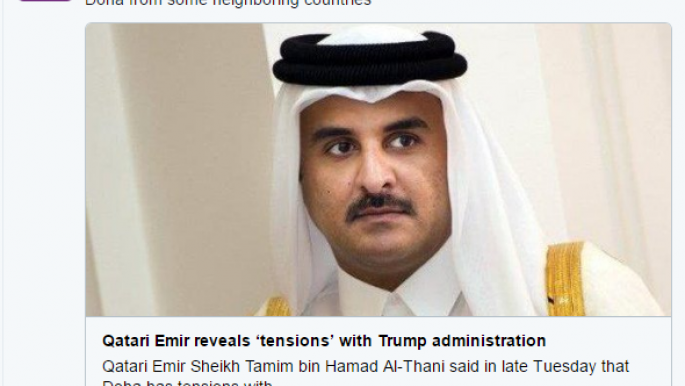
Emirati, Saudi media slammed for propagating Qatar 'fake news'
In particulal, they are incensed that the government-dominated outlets have failed to focus on the denial, instead using the fabricated statements to attack the government of Qatar.
Many took to twitter on Facebook to highlight the failure of Saudi and Emirati media to stick to professional standards and verify the remarks, hours after Qatar's official denials.
The state-run news agency said it was targeted by an "unknown entity", which published a fake statement attributed to Emir Tamim bin Hamad al-Thani about a number of comments on sensitive regional issues.
The remarks attributed to the emir claimed he spoke on Tuesday, two days after the Qatari leader and Trump met in Saudi Arabia as part of the president's recent visit to the Middle East, about the Palestinian-Israeli conflict, strategic relations with Iran, and comments about Palestinian Islamist movement Hamas.
In addition, QNA's hacked Twitter account contained a false story in Arabic apparently from the country's foreign minister, Mohammed bin Abdul Rahman Al Thani, about Qatar withdrawing its ambassadors from several nearby countries. The tweets were later deleted.
Qatar's Communications Office said the stories were completely untrue, and had "no basis whatsoever".
"The Qatar News Agency website has been hacked by an unknown entity," reported the Government Communications Office in a statement.
"A false statement attributed to His Highness has been published," with the department saying it is investigating the issue and will hold those found responsible to account.
Qatar-based media websites and phone applications, including al-Jazeera, were blocked in the UAE and Saudi Arabia, reports have said.
Meanwhile, Saudi and Emirati media channels, such as al-Arabiya and Sky News Arabia, permitted the fake news to run despite the swift denial from Qatari authorities, which provoked outrage among commentators in the Gulf.
Twitter Post
|
Twitter Post
|
Twitter Post
|
Twitter Post
|
Twitter Post
|
The Abu Dhabi-based Sky News Arabia ignored the denial and published the hacked report, hosting numerous commenters overnight and into Wednesday to give their insight into the remarks, which attempted to paint the tiny gas-rich Gulf state as a close ally to Islamic extremists.
 |
Translation [false statement]: Qatari Emir: There is continuous communication with Israel.
 |
Translation [false statement]: Qatari Emir says Iran guarantees stability in the region.
It aired footage allegedly from the Qatari state television's nightly newscast on Tuesday with a scrolling ticker at the bottom of the screen citing the alleged fake remarks. The content of the ticker was later reported to have been fabricated.
Twitter Post
|
Similarly, the Saudi-owned al-Arabiya on Wednesday afternoon continued to feature the false remarks as its top story hours after they had been declared untrue.
 |
"It is remarkable that these news outlets, which claim to be credible, have not asked a single Qatari political analyst to comment on the fake statement," Qatari media figure Jaber al-Harmi told The New Arab.
"This is the most basic rule of journalism, which confirms that their intentions are to harm Qatar and its relations with Gulf states," Harmi said.
A Wednesday statement by the Qatari foreign ministry criticised "some media outlets" for continuing to publish the false remarks despite the government denying them.
"They should have verified the false remarks and stopped circulating them, especially after the government made an official statement," the ministry's statement read.
"They violated professional and ethical rules," it added.
![Sheikh Tamim [AFP] Sheikh Tamim [AFP]](/sites/default/files/styles/large_16_9/public/media/images/CB51886F-1D8F-480F-ADB6-A7D3D5C22BCD.jpg?h=d1cb525d&itok=Hz7ffLU-)




 Follow the Middle East's top stories in English at The New Arab on Google News
Follow the Middle East's top stories in English at The New Arab on Google News


